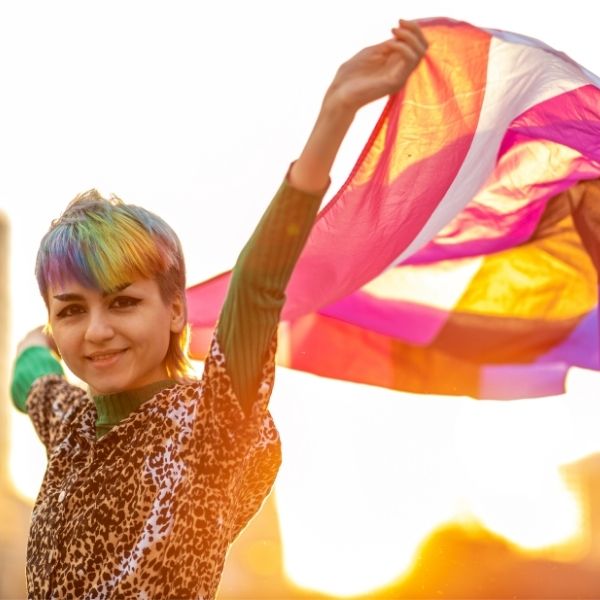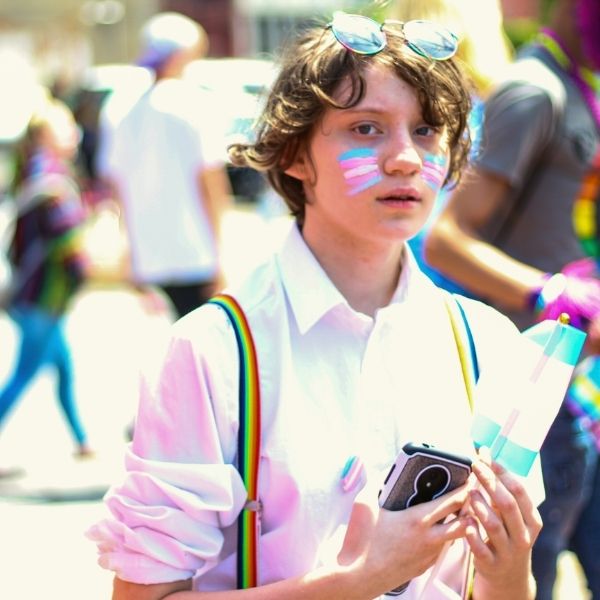faq's
- Lesbian: refers to a woman who is predominantly sexually and/or romantically attracted to other women. “Lesbian” can include nonbinary folks. Some women prefer the term “gay”.
- Gay: refers to a man who is predominantly sexually and/or romantically attracted to other men. “Gay” can also refer to any person who is predominantly sexually and/or romantically attracted to people of the same gender.
- Bisexual: refers to a person who is sexually and/or romantically attracted to both people of the same gender and people of different genders. “Bisexual” can also be defined as attraction to more than one gender.
- Transgender: refers to any person whose gender identity does not correspond to the sex they were assigned at birth. “Transgender” can be used as an umbrella term which includes Nonbinary people and does not require or imply social or physical transition.
- Queer: refers to people of any sexual orientation, any gender identity, or any gender expression that exists outside of cisgender, heterosexual, and allosexual identities. Some people view this as a reclaimed term of empowerment, and some people view this term as a slur.
- Questioning: refers to a person who is still exploring or unsure about their sexual orientation and/or gender identity and is in the process of coming to know themselves.
- Intersex: refers to a person whose anatomy, genetics, and/or hormones vary from that of ‘male’ or ‘female’
- Asexual: refers to a person with low or absent sexual or physical attraction to any gender. They may still desire romantic connection.
- Aromantic: refers to a person with low or absent romantic attraction to any gender. They may still desire sexual or physical connection.
- Plus: refers to people who are not cisgender, allosexual, and heterosexual, but whose identity labels are not explicitly named in the acronym, such as “Two-Spirit”, “Demisexual”, “Pansexual”, etc. “Plus” is meant to include any people who fall under the umbrella of sexual orientation, romantic orientation, gender identity, and/or gender expression minorities who do not feel comfortable or covered by the above defined words.
Absolutely not! Quite the opposite. Conversion therapy is an attempt to change someone’s sexual orientation or gender identity, whereas Kaleidoscope promotes accepting and affirming who a person is to improve their well-being. Conversion therapy is an illegal practice in the state of California as research indicates that it causes harm, including increasing suicidal thoughts and attempts.
Because we live in a society that centers heterosexual and cisgender experiences, some people incorrectly believe that being LGBTQ+ is a choice. However, research shows that it is not a choice, in the same way that being heterosexual or cisgender is not a choice. It’s more a matter of self-acceptance and then the ability to live as oneself in a safe and affirming environment.
Transgender people are people whose gender identity is different from the gender they were thought to be at birth, based upon the doctor’s assessment of their genitalia. Most people never think about their gender identity because it aligns with their sex assigned at birth i.e. cisgender. However, there are around 1.4 million transgender adults in the USA. For example, a woman who uses she/her pronouns and was assigned male at birth may use the term “transgender” to describe herself. This is just one example of being transgender as there are many gender identities and ways to express them. Some transgender people choose to make social or physical changes, and some do not. A transgender man is a man. A transgender woman is a woman. People who are nonbinary, transmasculine, transfeminine, or agender may also describe themselves as transgender.
Gender identity and sexual orientation are two independent things. Sexual orientation refers to who a person is physically or romantically attracted to. Gender identity refers to a person’s internal sense of being a man, woman, both, another gender, or no gender at all. Gender Identity does not necessarily correlate with sex assigned at birth and is not externally visible. Both transgender and cisgender people can be any sexual orientation.
Research shows that youth who are rejected by their families due to their sexual orientation or gender expression have much lower self-esteem and are at higher risk for mental health problems than youth who are accepted by their families and supported in their sexual orientation and gender expression. Young adults whose families supported their sexual orientation and gender expression as youth were much less likely to be depressed, abuse drugs, to engage in self-harm or to think about or attempt to take their own lives.


faq's
- Lesbian: refers to a woman who is predominantly sexually and/or romantically attracted to other women. “Lesbian” can include nonbinary folks. Some women prefer the term “gay”.
- Gay: refers to a man who is predominantly sexually and/or romantically attracted to other men. “Gay” can also refer to any person who is predominantly sexually and/or romantically attracted to people of the same gender.
- Bisexual: refers to a person who is sexually and/or romantically attracted to both people of the same gender and people of different genders. “Bisexual” can also be defined as attraction to more than one gender.
- Transgender: refers to any person whose gender identity does not correspond to the sex they were assigned at birth. “Transgender” can be used as an umbrella term which includes Nonbinary people and does not require or imply social or physical transition.
- Queer: refers to people of any sexual orientation, any gender identity, or any gender expression that exists outside of cisgender, heterosexual, and allosexual identities. Some people view this as a reclaimed term of empowerment, and some people view this term as a slur.
- Questioning: refers to a person who is still exploring or unsure about their sexual orientation and/or gender identity and is in the process of coming to know themselves.
- Intersex: refers to a person whose anatomy, genetics, and/or hormones vary from that of ‘male’ or ‘female’
- Asexual: refers to a person with low or absent sexual or physical attraction to any gender. They may still desire romantic connection.
- Aromantic: refers to a person with low or absent romantic attraction to any gender. They may still desire sexual or physical connection.
- Plus: refers to people who are not cisgender, allosexual, and heterosexual, but whose identity labels are not explicitly named in the acronym, such as “Two-Spirit”, “Demisexual”, “Pansexual”, etc. “Plus” is meant to include any people who fall under the umbrella of sexual orientation, romantic orientation, gender identity, and/or gender expression minorities who do not feel comfortable or covered by the above defined words.
Absolutely not! Quite the opposite. Conversion therapy is an attempt to change someone’s sexual orientation or gender identity, whereas Kaleidoscope promotes accepting and affirming who a person is to improve their well-being. Conversion therapy is an illegal practice in the state of California as research indicates that it causes harm, including increasing suicidal thoughts and attempts.
Because we live in a society that centers heterosexual and cisgender experiences, some people incorrectly believe that being LGBTQ+ is a choice. However, research shows that it is not a choice, in the same way that being heterosexual or cisgender is not a choice. It’s more a matter of self-acceptance and then the ability to live as oneself in a safe and affirming environment.
Transgender people are people whose gender identity is different from the gender they were thought to be at birth, based upon the doctor’s assessment of their genitalia. Most people never think about their gender identity because it aligns with their sex assigned at birth i.e. cisgender. However, there are around 1.4 million transgender adults in the USA. For example, a woman who uses she/her pronouns and was assigned male at birth may use the term “transgender” to describe herself. This is just one example of being transgender as there are many gender identities and ways to express them. Some transgender people choose to make social or physical changes, and some do not. A transgender man is a man. A transgender woman is a woman. People who are nonbinary, transmasculine, transfeminine, or agender may also describe themselves as transgender.
Gender identity and sexual orientation are two independent things. Sexual orientation refers to who a person is physically or romantically attracted to. Gender identity refers to a person’s internal sense of being a man, woman, both, another gender, or no gender at all. Gender Identity does not necessarily correlate with sex assigned at birth and is not externally visible. Both transgender and cisgender people can be any sexual orientation.
Research shows that youth who are rejected by their families due to their sexual orientation or gender expression have much lower self-esteem and are at higher risk for mental health problems than youth who are accepted by their families and supported in their sexual orientation and gender expression. Young adults whose families supported their sexual orientation and gender expression as youth were much less likely to be depressed, abuse drugs, to engage in self-harm or to think about or attempt to take their own lives.

Young Adults & Teens
All of our social groups and events are free to attend, and we have both in person and virtual offerings. Please register through the Evite link provided on the website on our events page, and you’ll receive the Zoom info or in person details prior to the meeting.
We have groups for ages 12-27, and 18-24.
If you’re outside the age range of a group, still reach out! We can recommend an alternative program of our own or refer you to a different organization.
Yes! Bring a friend, bring two. Our groups are open to LGBTQIA+/Questioning and allies, neurodivergent and neurotypical. We want Kaleidoscope to feel like a place where everyone is welcome and everyone belongs.
Being ‘out’ is a personal choice and never a requirement for group participation. All allies and supporters of LGBTQ folks are encouraged to attend regardless of where you are on your own identity journey.



Young Adults & Teens
All of our social groups and events are free to attend, and we have both in person and virtual offerings. Please register through the Evite link provided on the website on our events page, and you’ll receive the Zoom info or in person details prior to the meeting.
We have groups for ages 12-27, and 18-24.
If you’re outside the age range of a group, still reach out! We can recommend an alternative program of our own or refer you to a different organization.
Yes! Bring a friend, bring two. Our groups are open to LGBTQIA+/Questioning and allies, neurodivergent and neurotypical. We want Kaleidoscope to feel like a place where everyone is welcome and everyone belongs.
Being ‘out’ is a personal choice and never a requirement for group participation. All allies and supporters of LGBTQ folks are encouraged to attend regardless of where you are on your own identity journey.
Parents
Any interested parent or caregiver can join our free monthly parent support group! We also highly recommend encouraging the LGBTQIA+ young folks in your life to participate in accepting communities and social groups as doing so has been correlated with better outcomes. Parents can help by supporting your child through the registration process and ensuring they receive the event information via email.
By registering online. Once they do that your child will receive the event information via email, a zoom link for online events and further details for in-person events.
The majority of our events and social support groups (including Parent & Caregiver support group) are available free of charge. If you are interested in our LGBTQ+ Autism Diagnostic Evaluation, therapy, or a group class – please fill out this form for more information: luminacounselingla.com/get-started
According to The Family Acceptance Project family behaviors that can increase your LGBTQ+ child’s health and well-being are…
- Use your child’s chosen name and pronouns
- Tell your child you’re proud of them
- Require all family members to treat your child with respect
- Connect your child with LGBTQ adult role models
- Tell your LGBTQ/gender diverse child that you will be there for them – even if you don’t fully understand
- Believe that your child can be a happy LGBTQ adult – and tell them they will have a good life
Adolescence and young adulthood is a time of exploration for all young people. However, it is important to support a youth where they are on any given day. Treating a young person’s self-defined sexual orientation or gender identity as “experimental” or a “phase” is an example of anti-gay or anti-transgender bias, and it could be interpreted it as rejection. Research shows the significantly detrimental effects of rejecting a youth’s identity as well as the positive effects of accepting them. We encourage all parents to support their children with where they are in the journey, and we also acknowledge that this is a journey for parents, too, and to seek support and guidance for yourself where you might need it.






Parents
Any interested parent or caregiver can join our free monthly parent support group! We also highly recommend encouraging the LGBTQIA+ young folks in your life to participate in accepting communities and social groups as doing so has been correlated with better outcomes. Parents can help by supporting your child through the registration process and ensuring they receive the event information via email.
By registering online. Once they do that your child will receive the event information via email, a zoom link for online events and further details for in-person events.
The majority of our events and social support groups (including Parent & Caregiver support group) are available free of charge. If you are interested in our LGBTQ+ Autism Diagnostic Evaluation, therapy, or a group class – please fill out this form for more information: luminacounselingla.com/get-started
According to The Family Acceptance Project family behaviors that can increase your LGBTQ+ child’s health and well-being are…
- Use your child’s chosen name and pronouns
- Tell your child you’re proud of them
- Require all family members to treat your child with respect
- Connect your child with LGBTQ adult role models
- Tell your LGBTQ/gender diverse child that you will be there for them – even if you don’t fully understand
- Believe that your child can be a happy LGBTQ adult – and tell them they will have a good life
Adolescence and young adulthood is a time of exploration for all young people. However, it is important to support a youth where they are on any given day. Treating a young person’s self-defined sexual orientation or gender identity as “experimental” or a “phase” is an example of anti-gay or anti-transgender bias, and it could be interpreted it as rejection. Research shows the significantly detrimental effects of rejecting a youth’s identity as well as the positive effects of accepting them. We encourage all parents to support their children with where they are in the journey, and we also acknowledge that this is a journey for parents, too, and to seek support and guidance for yourself where you might need it.



Professional
Anyone is welcome to join our social support groups by registering through the , which has all of our current groups listed by time and age. If you are referring a client for therapy, please contact our Program Director, Jeri Rochman at (818) 779-5229 or [email protected] for more information.
- Free facilitated social support groups for LGBTQIA+/Questioning young people ages 11 through 24 as well as their families.
- Individual therapy
- Therapeutic Support group for Parents/caregivers of LGBTQIA+ young people
- LGBTQ+ Autism Diagnostic Evaluations
- Trainings and Workshops for educators, mental health providers, schools, and organizations



Professional
Anyone is welcome to join our social support groups by registering through the , which has all of our current groups listed by time and age. If you are referring a client for therapy, please contact our Program Director, Jeri Rochman at (818) 779-5229 or [email protected] for more information.
- Free facilitated social support groups for LGBTQIA+/Questioning young people ages 11 through 24 as well as their families.
- Individual therapy
- Therapeutic Support group for Parents/caregivers of LGBTQIA+ young people
- LGBTQ+ Autism Diagnostic Evaluations
- Trainings and Workshops for educators, mental health providers, schools, and organizations